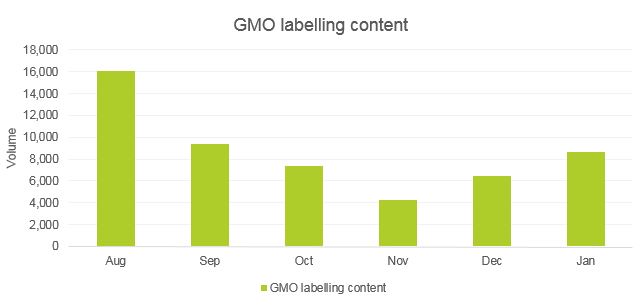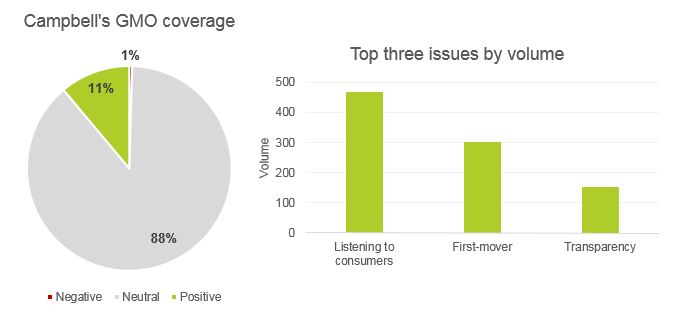Campbell’s and GMOs: a case study in consumer engagement
alva has been monitoring the reputational risks and opportunities associated with Genetrically Modified Organisms (GMOs) for several years, and, over the past several months, the discussion around GMO labelling has continued, especially in several US states currently debating the possibility of legislation requiring labelling of products containing GMOs.
While potential health risks associated with GMOs have been subject to debate, the transparency and consumer rights linked with product labelling have garnered more consistent praise.
Over the last six months, GMO labelling coverage peaked in August, in line with US Congressional debates around the Safe and Accurate Food Labeling Act, which would prevent states from mandating GMO labels. However, the introduction of the GMA’s SmartLabel initiative has boosted coverage around GMO labelling in the last two months.

Another specific initiative boosting recent GMO coverage is a company’s decision to voluntarily label GMO ingredients.
Soup maker Campbell’s has recently become the “first major company” to commit to labelling all products that contain GMOs. The company’s decision represents a split from the rest of the sector, where some food manufacturers have staunchly opposed calls for GMO labelling.
So how has Campbell’s reputation been affected by its GMO labelling decision?
alva analysed over 13,000 pieces of publicly-available content to measure which messages have generated the most reputational positivity for Campbell’s, and from which stakeholder groups. This data was sourced from print, online, broadcast and social media among others and it covered global English language content.
Coverage of Campbell’s GMO labelling decision was 98% positive or neutral.

Listening to consumers: Of coverage that was explicitly positive, 31% thanked Campbell’s for “listening to consumers” in its decision. NGO EWG was re-tweeted or mentioned over 480 times, amplifying this message on social media – the ultimate consumer medium.
First-mover: 20% of positive content focused on Campbell’s as the first US company and large food manufacturer to label GMO ingredients. It is likely that first-mover advantage was amplified by national media coverage and will have made this issue more positively impactful and longer-lasting for Campbell’s than it will be for other companies in future. alva has seen similar trends emerge in relation to Living Wage accreditation and the discontinuation of premium rate phone lines in the financial services sector.
Transparency: Transparency was the third most visible positive message (10%) related to Campbell’s after its labelling announcement in January. Opinion leaders and industry experts including “America’s truth news bureau” Natural News, chefs Andrew Zimmern and Michael Pollan, actress Beth Riesgraf and B Corp sustainability publication Triple Pundit on social media “thanked” the company for furthering transparency in the food industry.
By sticking its head above the parapet with its labelling decision, Campbell’s has begun to build a reputation as a consumer-focused, transparent organisation that has “split” from industry norms. The risk here is that Campbell’s might become an easy target for claims of hypocrisy or impure motives or simply not going “far enough”. However, thus far, the reputational benefits seem to have outweighed these risks, as NGOs, national media, opinion leaders and industry experts who have an opinion tend to have a positive one.
Other companies thinking of making a similar decision could learn from Campbell’s and position themselves as responding to customers’ calls for transparency – messaging that generated positivity across multiple stakeholders – in addition, of course, to any proven health risks.
Please contact us for further information on how reputation and media intelligence can identify risks and opportunities for your company.
Be part of the
Stakeholder Intelligence community







